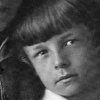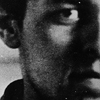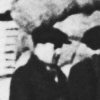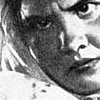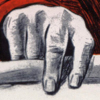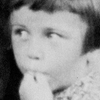Early Years: 1921-1944
Andrei Sakharov was born in Moscow on May 21, 1921 to a family of Russian intelligentsia. His father, Dmitri, taught physics at a college and wrote textbooks and popular science books. His mother, Ekaterina, devoted her life to the family. Among Andrei’s ancestors were military nobility and Orthodox priests. His mother and grandmother were believers, while his father was not. At 13, Andrei decided that he, too, was not. His was the first Soviet generation, brought up under the spell of communist ideals of equality and social justice. Andrei at first studied at home and only entered school at the seventh grade. His first physics teacher was his father, a man of warmth and culture.
“I inherited my physical appearance from my mother and grandmother, particularly the Mongol cast of my eyes, and something of my character as well: a certain obstinacy, as well as an awkwardness in dealing with people that troubled me for much of my life.”
Andrei was an introvert, concentrated on his own feelings and intellectual issues. His internal world – in particular a very strong interest in the poetry and life of Alexander Pushkin – was open to very few people. It was easier to notice his ability to write with both hands at once.
“Just in a physical way Andrei was particularly visible... tall, thin, in his invariable black, narrow and shortish trousers and black, tight suit coat with short sleeves. Everyone is arguing and agitated but only Andrei, holding a pack of books and notebooks under his arm, is quiet, and seems to be too bashful to say anything. Looking at him I thought: ’Poor boy!’ I was sorry for him, he was so shy and clumsy. What will happen to him?”
- Sakharov as remembered by his university classmate Leon Bell Red
It was not a good time for studies when Andrei entered Moscow University in 1938 as a student in the physics department. Stalinist purges had cost the department its best teachers. Further disturbance came with the German invasion of 1941. Andrei, along with other students, served on duty during air raids, extinguished incendiary bombs, and unloaded railroad cars. During these same days he started working on his first scientific inventions. A magnetic device was needed to detect shrapnel in wounded horses.
Physics students were accepted into the Air Force Academy, but the medical commission did not pass Sakharov:
“I was disappointed then, but later considered that I had been lucky – the students accepted into the Air Force Academy spent nearly the entire war at their studies, while I worked at a cartridge plant for two-and-a-half years, and made a timely, albeit small, contribution. ...As it turned out, I never served in the Army, as had the majority of my generation, and I remained alive while many others died.”
In October 1941, the remaining university students were evacuated to Central Asia by freight train. The journey took a month. One sentence tells everything: “Once I saw a spice cake which someone had dropped in the snow and ate it immediately.” The period of study at the university was reduced by a year, and in 1942 Sakharov graduated with honors.
With the war at its height Sakharov declined an opportunity to go to graduate school. He was assigned instead to routine laboratory work at a cartridge manufacturing plant in Ulyanovsk on the Volga River. There he met Klavdia Vikhireva, a laboratory technician; they married in 1943. During his years at the cartridge plant he authored a few engineering inventions, and the thoughts about his “cartridge” inventions led him to some problems of theoretical physics. By early 1945, as the war was ending, Sakharov felt an urge to resume his study of physics.

